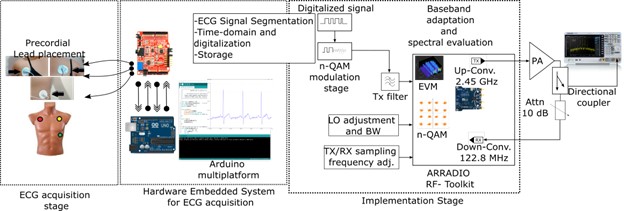Development of an Adaptive Acquisition and Transmission System for Digital Processing of ECG Signals under Variable n-QAM Schemes
DOI:
https://doi.org/10.17488/RMIB.44.4.8Keywords:
ECG, n-QAM, RF, telemedicine, transceiverAbstract
In the post-pandemic era, it is critical to monitor and transmit biomedical signals, specifically ECG. This study aims to develop a platform that enables signal acquisition, adaptation, and transmission using different n-QAM modulation schemes. The system comprises an acquisition stage implemented in the 2.5 GHz band employing the Olimex module and electrodes equipped with an Ag/AgCl type sensor. To effectively manage appropriate bandwidths during implementation of the various n-QAM modulation schemes, an adaptive algorithm was developed and applied to the system. The power amplifier was operated in the linear region to enhance the crest factor and achieve an ACPR close to 30 dBc, demonstrating an appropriate demodulation of the electrocardiogram (ECG) signal, it is feasible to shift to modulation schemes above 64-QAM in order to detect high frequencies and perform a subsequent Fourier analysis. As a telemedicine proposal, the developed system offers flexibility in signal acquisition, data storage, and digitalization, in addition to a multivariable n-QAM scheme; the hardware implementation ensures n-QAM scheme compatibility. For the purpose of contributing to telemedicine via RF transmission, the system was executed on an AD9361 transceiver, which removes the requirement for a traditional signal vector generator and enables optimal control of the tones to be transmitted.
Downloads
References
World Health Organization, “Cardiovascular diseases (CVDs),” WHO. 2021. [Online]. Available: https://www.who.int/news-room/fact-sheets/detail/cardiovascular-diseases-(cvds)
A. Ibaida, A. Abuadbba, N. Chilamkurti, “Privacy-preserving compression model for efficient IoMT ECG sharing,” Comput. Commun., vol. 166, no. 15, pp. 1-8, Jan. 2021, doi: https://doi.org/10.1016/j.comcom.2020.11.010
C. De Capua, A. Meduri and R. Morello, “A Smart ECG Measurement System Based on Web-Service-Oriented Architecture for Telemedicine Applications,” IEEE Trans. Instrum. Meas., vol. 59, no. 10, pp. 2530-2538, Oct. 2010, doi: https://doi.org/10.1109/TIM.2010.2057652
J. Francis, “ECG monitoring leads and special leads,” Indian Pacing Electrophysiol. J., vol. 16, no. 3, pp. 92–95, 2016, doi: https://doi.org/10.1016/j.ipej.2016.07.003
I. -A. Ivanciu, L. Ivanciu, D. Zinca, and V. Dobrota, “Securing Health-Related Data Transmission Using ECG and Named Data Networks,” in 2019 IEEE International Symposium on Local and Metropolitan Area Networks (LANMAN), Paris, France, 2019, pp. 1-6, doi: https://doi.org/10.1109/LANMAN.2019.8846993
M. Zulqarnain, S. Stanzione, G. Rathinavel, S. Smout, M. Willegems, K. Myny, and E. Cantatore, “A flexible ECG patch compatible with NFC RF communication,” npj Flex. Electron., vol. 4, art. no. 13, Jul. 2020, doi: https://doi.org/10.1038/s41528-020-0077-x
Y. Cho, H. Shin, and K. Kang, “Scalable Coding and Prioritized Transmission of ECG for Low-Latency Cardiac Monitoring Over Cellular M2M Networks,” IEEE Access, vol. 6, pp. 8189-8200, Jan. 2018, doi: https://doi.org/10.1109/ACCESS.2018.2795028
N. Clark, E. Sandor, C. Walden, I. S. Ahn and Y. Lu, “A wearable ECG monitoring system for real-time arrhythmia detection,” in 2018 IEEE 61st International Midwest Symposium on Circuits and Systems (MWSCAS), Windsor, ON, Canada, 2018, pp. 787-790, doi: https://doi.org/10.1109/MWSCAS.2018.8624097
G. Cosoli, S. Spinsante, F. Scardulla, L. D'Acquisto and L. Scalise, “Wireless ECG and cardiac monitoring systems: State of the art, available commercial devices and useful electronic components,” Measurement, vol. 177, art. no. 109243, Jun. 2021, doi: https://doi.org/10.1016/j.measurement.2021.109243
S. M. Noor, E. John, and M. Panday, “Design and Implementation of an Ultralow-Energy FFT ASIC for Processing ECG in Cardiac Pacemakers,” IEEE Trans. Very Large Scale Integr. VLSI Syst., vol. 27, no. 4, pp. 983-987, Apr. 2019, doi: https://doi.org/10.1109/TVLSI.2018.2883642
A. L. Goldberger, L. A. Amaral, L. Glass, J. M. Hausdorff, et al., “PhysioBank, PhysioToolkit, and PhysioNet: Components of a new research resource for complex physiologic signals,” Circulation, vol. 101, no. 23, pp. e215–e220, 2000, doi: https://doi.org/10.1161/01.cir.101.23.e215
C. Kim, Y. H. Yun, K. Kim, and J. -Y. Seol, “Introduction to QAM-FBMC: From Waveform Optimization to System Design,” IEEE Commun. Mag., vol. 54, no. 11, pp. 66-73, Nov. 2016, doi: https://doi.org/10.1109/MCOM.2016.1600384CM
C. -H. Heng and K. -H. Teng, “Reconfigurable, energy efficient transmitter with band-shaping and multi-channel support for biomedical applications,” in 2016 URSI Asia-Pacific Radio Science Conference (URSI AP-RASC), Seoul, Korea (South), 2016, pp. 986-989, doi: https://doi.org/10.1109/URSIAP-RASC.2016.7601308
B. O. hAnnaidh, P. Fitzgerald, H. Berney, R. Lakshmanan, N. Coburn, S. Geary, B. Mulvey, “Devices and Sensors Applicable to 5G System Implementations,” in 2018 IEEE MTT-S International Microwave Workshop Series on 5G Hardware and System Technologies (IMWS-5G), Dublin, Ireland, 2018, pp. 1-3, doi: https://doi.org/10.1109/IMWS-5G.2018.8484316
T.-H. Tsai and W.-T. Kuo, “An Efficient ECG Lossless Compression System for Embedded Platforms With Telemedicine Applications,” IEEE Access, vol. 6, pp. 42207-42215, Jul. 2018, doi: https://doi.org/10.1109/ACCESS.2018.2858857
N. Wang, J. Zhou, G. Dai, J. Huang, and Y. Xie, “Energy-Efficient Intelligent ECG Monitoring for Wearable Devices,” IEEE Trans. Biomed. Circuits Syst., vol. 13, no. 5, pp. 1112-1121, Oct. 2019, doi: https://doi.org/10.1109/TBCAS.2019.2930215
K. Nakatani, Y. Yamaguchi, Y. Komatsuzaki, S. Sakata, S. Shinjo, and K. Yamanaka, “A Ka-Band High Efficiency Doherty Power Amplifier MMIC using GaN-HEMT for 5G Application,” in 2018 IEEE MTT-S International Microwave Workshop Series on 5G Hardware and System Technologies (IMWS-5G), Dublin, Ireland, 2018, pp. 1-3, doi: https://doi.org/10.1109/IMWS-5G.2018.8484612
D. Lucani, G. Cataldo, J. Cruz, G. Villegas, and S. Wong, “A portable ECG monitoring device with Bluetooth and Holter capabilities for telemedicine applications,” in 2006 International Conference of the IEEE Engineering in Medicine and Biology Society, New York, NY, USA, 2006, pp. 5244-5247, doi: https://doi.org/10.1109/IEMBS.2006.260798
P. K. Singya, P. Shaik, N. Kumar, V. Bhatia, and M.-S. Alouini, “A Survey on Higher-Order QAM Constellations: Technical Challenges, Recent Advances, and Future Trends,” in IEEE Open J. Commun. Soc., vol. 2, pp. 617-655, 2021, doi: https://doi.org/10.1109/OJCOMS.2021.3067384
T. S. Rappaport, Wireless Communications: Principles and Practice, vol. 2. Upper Saddle River, NJ, USA: Prentice-Hall PTR, 1996.
F. Mazzenga, “Channel estimation and equalization for M-QAM transmission with a hidden pilot sequence,” IEEE Trans. Broadcast., vol. 46, no. 2, pp. 170-176, 2000, doi: https://doi.org/10.1109/11.868934
J. G. Proakis and M. Salehi, Digital Communications, 2nd ed. NJ, USA: McGraw-Hill, Higher education, 2008.
“IEEE Standard for Telecommunications and Information Exchange Between Systems - LAN/MAN Specific Requirements - Part 11: Wireless Medium Access Control (MAC) and physical layer (PHY) specifications: High Speed Physical Layer in the 5 GHz band,” in IEEE Std 802.11a-1999, pp.1-102, 1999, doi: https://doi.org/10.1109/IEEESTD.1999.90606
B. Abi-Saleh, B. Omar, “Einthoven’s Triangle Transparency: A Practical Method to Explain Limb Lead Configuration Following Single Lead Misplacements,” Rev. Cardiovasc. Med.,” vol. 11, no. 1, pp. 33–38, 2010, doi: https://doi.org/10.3909/ricm0506

Published
How to Cite
Issue
Section
License
Copyright (c) 2023 Revista Mexicana de Ingenieria Biomedica

This work is licensed under a Creative Commons Attribution-NonCommercial 4.0 International License.
Upon acceptance of an article in the RMIB, corresponding authors will be asked to fulfill and sign the copyright and the journal publishing agreement, which will allow the RMIB authorization to publish this document in any media without limitations and without any cost. Authors may reuse parts of the paper in other documents and reproduce part or all of it for their personal use as long as a bibliographic reference is made to the RMIB. However written permission of the Publisher is required for resale or distribution outside the corresponding author institution and for all other derivative works, including compilations and translations.







